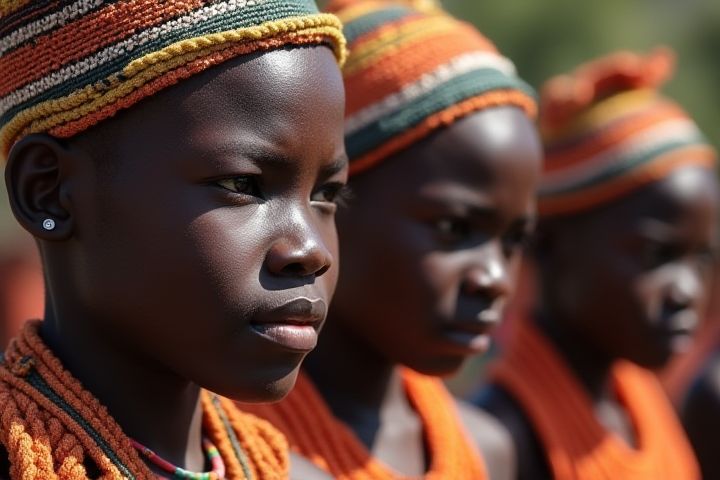
Indigenous Peoples in Nigeria represent a rich tapestry of cultural diversity, with over 250 ethnic groups contributing to the nation's heritage. Among these, the Yoruba, Hausa, and Igbo are the most prominent, each possessing unique languages, traditions, and social structures. The Indigenous Peoples maintain various traditional practices, such as festivals, art, and music, which play a crucial role in preserving their identities and beliefs. Additionally, they face contemporary challenges, including land tenure disputes and the impacts of urbanization, which threaten their livelihoods and cultural practices. Understanding the struggles and contributions of Indigenous Peoples is vital for fostering appreciation and promoting equitable development in Nigeria.
Diverse ethnic groups
Indigenous Peoples in Nigeria comprise over 250 diverse ethnic groups, each with unique languages, traditions, and cultural practices. The largest among these, the Hausa, Yoruba, and Igbo, reflect a rich tapestry of Nigeria's heritage, influencing local customs, arts, and social structures. Ethnic diversity fosters vibrant festivals, traditional music, and artisan crafts that contribute significantly to the national identity and economy. Understanding these distinct groups is crucial for promoting cultural preservation and social cohesion within Nigeria's multifaceted society.
Rich cultural heritage
Indigenous Peoples in Nigeria possess a rich cultural heritage characterized by diverse languages, traditional beliefs, and artistic expressions. Each ethnic group contributes unique customs, from the vibrant festivals of the Yoruba to the intricate wood carvings of the Ekoi. Traditional music and dance play a vital role in community life, often reflecting historical narratives and societal values. Emphasizing the importance of cultural preservation, these groups strive to maintain their identities amidst modern influences and globalization.
Traditional religions
Indigenous Peoples in Nigeria engage deeply with Traditional religions, which are deeply rooted in their cultural heritage and involve a rich tapestry of beliefs, rituals, and practices. These religions emphasize a profound connection to ancestors, nature, and spiritual forces, often manifested through ceremonies, festivals, and communal gatherings. The diverse ethnic groups, such as the Yoruba, Igbo, and Hausa, showcase unique spiritual practices, yet they share common themes like reverence for the land and the importance of oral traditions. Your understanding of these traditions can enhance appreciation for Nigeria's cultural diversity and the resilience of its Indigenous communities.
Unique languages
Indigenous Peoples in Nigeria showcase a rich tapestry of unique languages, with over 500 distinct languages spoken across the country. These languages, such as Hausa, Yoruba, and Igbo, are not only a means of communication but also vital to the preservation of cultural identity and heritage. Efforts are underway to promote linguistic diversity and combat language extinction through educational programs and cultural initiatives. Understanding and appreciating these languages can enrich your knowledge of Nigeria's diverse ethnic landscape and social fabric.
Distinct art forms
Indigenous Peoples in Nigeria showcase a rich tapestry of distinct art forms that reflect their diverse cultures and traditions. From the intricate beadwork of the Tiv to the vibrant textiles of the Yoruba, each art form serves as a medium for storytelling and cultural expression. Traditional sculptures, often made from wood or bronze, carry deep spiritual significance, representing ancestral worship and community identity. Engaging with these art forms offers you a unique insight into the values and heritage of Nigeria's Indigenous Peoples, fostering appreciation for their creative legacies.
Varied traditional attire
Indigenous Peoples in Nigeria showcase a rich tapestry of traditional attire that reflects their diverse cultures and histories. Each ethnic group, from the Yoruba to the Ibo and Hausa, embraces unique fabrics, colors, and designs that often symbolize social status, occasions, or rites of passage. For instance, the vibrant Aso Oke worn by the Yoruba people is often used in ceremonies and weddings, while the Ibo tradition features the intricately woven Isi Agu. Such attire not only serves as a form of identity but also embodies the craftsmanship and artistic expression inherent in Nigeria's cultural heritage.
Customary governance systems
Indigenous Peoples in Nigeria rely heavily on customary governance systems that are deeply rooted in their cultural heritage and community practices. These systems often prioritize traditional leaders, who play crucial roles in conflict resolution, resource management, and maintaining social order within their communities. This governance model fosters a sense of identity and belonging among the members, as it aligns with their historical customs and traditions. By engaging with these systems, you can better understand the unique socio-political dynamics that shape the lives of Indigenous Peoples in Nigeria.
Traditional festivals
Traditional festivals are a vibrant expression of Nigeria's Indigenous Peoples, showcasing rich cultural heritage and community values. These festivals often commemorate historical events, agricultural cycles, or spiritual beliefs, bringing together diverse ethnic groups such as the Yoruba, Igbo, and Hausa. Each festival features unique rituals, traditional music, dance performances, and colorful attire, reflecting the local customs and social structures. Participating in these celebrations offers you an opportunity to experience the profound connection between the people and their ancestral traditions while promoting cultural preservation.
Indigenous knowledge systems
Indigenous Peoples in Nigeria emphasize the importance of Indigenous knowledge systems that integrate ecological wisdom, cultural practices, and community-driven governance. These knowledge systems represent a rich tapestry of traditions passed down through generations, playing a crucial role in sustainable agriculture, herbal medicine, and environmental conservation. Through practices such as crop rotation and the use of native plants, Indigenous communities enhance biodiversity and resilience against climate change. Engaging with these systems not only strengthens cultural identities but also offers valuable insights for contemporary environmental stewardship and policy-making.
Land rights issues
Indigenous Peoples in Nigeria actively advocate for land rights, emphasizing the significance of ancestral territories for cultural heritage and livelihood. These communities face challenges from land dispossession due to agricultural expansion, mining operations, and urbanization, which threaten their traditional ways of life. Legal frameworks, such as the Land Use Act, often inadequately protect indigenous land claims, leaving these populations vulnerable. Your support for recognizing and upholding the rights of these groups can contribute to social justice and environmental sustainability in the region.
